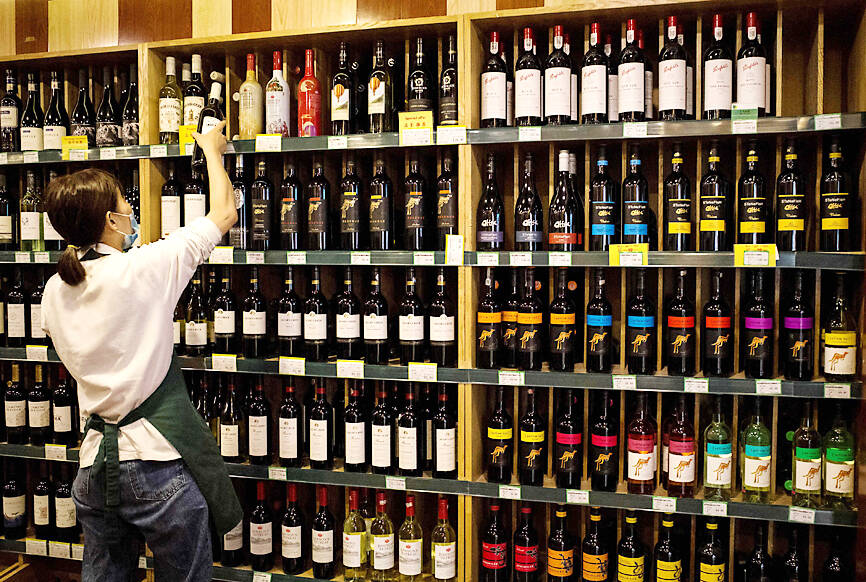China has lifted its punitive tariffs on Australia’s wine exports, signaling an end to a three-year campaign of trade pressure on Canberra and raising hopes for a revival of the billion-dollar industry.
The Chinese Ministry of Commerce announced the move yesterday. The industry has been anticipating the announcement for weeks after some Australian vintners and lawmakers said the Asian nation had made an interim recommendation to lift the import taxes.
“In view of the changes in the relevant wine market conditions in China, it is no longer necessary to impose anti-dumping duties and countervailing duties on imported relevant wines originating in Australia,” the ministry said in a statement.

Photo: AFP
The decision to remove trade curbs has raised hopes of reviving the lucrative wine trade between the two nations, but Australia China Business Council national president David Olsson on Wednesday said that winemakers might not make a full return to the market.
“We expect to see a significant proportion of the wine coming back into China, but not all of it. A lot of it is just looking to other markets,” Olsson told Bloomberg Television.
China imposed tariffs of up to 218 percent on Australian wine in March 2021, after then-Australian prime minister Scott Morrison called for an international probe into the origins of the COVID-19 pandemic. The decision has contributed to a glut that has brought the wine industry to its knees.
China was Australia’s top wine export destination in 2019, accounting for A$1.1 billion (US$714 million).
Relations between the two nations started improving after the May 2022 election of Australian Prime Minister Anthony Albanese’s government, culminating in his visit to Beijing in November last year.
Trade curbs on some other Australian commodities have already been withdrawn. China now accounts for about 90 percent of the nation’s barley exports after tariffs were scrapped in August last year.
Australian businesses are looking forward to China removing restrictions on eight Australian abattoirs and the import of live lobsters, China-Australia Chamber of Commerce chairman Vaughn Barber said last week.
China has not officially acknowledged its restrictions on lobsters from Australia.
Separately, Australia is to invest A$1 billion to ensure more solar panels are made domestically, as the nation looks to reduce its dependence on imports from China.
The Solar Sunshot program is to offer production subsidies and grants to help Australia capture more of the global solar manufacturing supply chain, the government said in a statement.
While Australia has the highest uptake of rooftop solar in the world — with panels on one in three households — just 1 percent of those have been made locally, it said.
China provides more than 90 percent of Australia’s panels.
“Australia should not be the last link in a global supply chain built on an Australian invention,” Albanese said in the statement, referring to pioneering work on the technology at the University of New South Wales.
“We have every metal and critical mineral necessary to be a central player in the net zero transformation, and a proven track record as a reliable energy producer and exporter,” he said.
Global solar supply is facing a crisis after the rapid expansion of plants outpaced demand and squeezed margins, Bloomberg NEF said in a report this month.
About US$78 billion of surplus solar manufacturing capacity could be added through 2027, it said.

Semiconductor business between Taiwan and the US is a “win-win” model for both sides given the high level of complementarity, the government said yesterday responding to tariff threats from US President Donald Trump. Home to the world’s largest contract chipmaker, Taiwan Semiconductor Manufacturing Co (TSMC, 台積電), Taiwan is a key link in the global technology supply chain for companies such as Apple Inc and Nvidia Corp. Trump said on Monday he plans to impose tariffs on imported chips, pharmaceuticals and steel in an effort to get the producers to make them in the US. “Taiwan and the US semiconductor and other technology industries

CHIP WAR: Tariffs on Taiwanese chips would prompt companies to move their factories, but not necessarily to the US, unleashing a ‘global cross-sector tariff war’ US President Donald Trump would “shoot himself in the foot” if he follows through on his recent pledge to impose higher tariffs on Taiwanese and other foreign semiconductors entering the US, analysts said. Trump’s plans to raise tariffs on chips manufactured in Taiwan to as high as 100 percent would backfire, macroeconomist Henry Wu (吳嘉隆) said. He would “shoot himself in the foot,” Wu said on Saturday, as such economic measures would lead Taiwanese chip suppliers to pass on additional costs to their US clients and consumers, and ultimately cause another wave of inflation. Trump has claimed that Taiwan took up to

A start-up in Mexico is trying to help get a handle on one coastal city’s plastic waste problem by converting it into gasoline, diesel and other fuels. With less than 10 percent of the world’s plastics being recycled, Petgas’ idea is that rather than letting discarded plastic become waste, it can become productive again as fuel. Petgas developed a machine in the port city of Boca del Rio that uses pyrolysis, a thermodynamic process that heats plastics in the absence of oxygen, breaking it down to produce gasoline, diesel, kerosene, paraffin and coke. Petgas chief technology officer Carlos Parraguirre Diaz said that in

Japan intends to closely monitor the impact on its currency of US President Donald Trump’s new tariffs and is worried about the international fallout from the trade imposts, Japanese Minister of Finance Katsunobu Kato said. “We need to carefully see how the exchange rate and other factors will be affected and what form US monetary policy will take in the future,” Kato said yesterday in an interview with Fuji Television. Japan is very concerned about how the tariffs might impact the global economy, he added. Kato spoke as nations and firms brace for potential repercussions after Trump unleashed the first salvo of